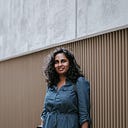‘The Bengali’ (2021) DOC NYC Review: The Journey to Find a Sense of Belonging in a New Land
Kavery Kaul’s documentary, The Bengali, premiered at the DOC NYC Film Festival, and centres around Fatima Shaik and her journey to seek the truth about her grandfather’s past. Her grandfather, Shaik Muhammed Musa, is one of many Indian men that immigrated to New Orleans in 1893. Upon arrival, he married an African-American woman, and throughout Fatima’s childhood, she heard stories about her grandfather owning land in India. Fatima has never been to Kolkata, and she has felt misplaced in her life. According to her father, Muhammed spoke of having been educated in Oxford and owning land in Kolkata, but no one knew if the latter statement was ever true.
Fatima and her family have been through a lot of difficult changes in their lives. She talks about how their family was devastated by the floods in New Orleans; not only did her family lose their homes during the floods but some family members lost their lives as well. Fatima’s father was the one initially searching for Muhammed’s land in Kolkata and following his death, this task was now Fatima’s burden to bear. Fatima and her family have always been doubtful about her grandfather’s past and so, Fatima sets out on a journey to find the truth about his past.
When Fatima arrives in Khori, the villagers are sceptical of her; the sight of an American in their parts of the village was a strange sight to witness. She walks around the area asking people and showing them her grandfather’s followers, but the villagers are reluctant to give her any information. Through private conversations with Kaul, they come to believe that she is after their farmlands and refuse to let her search for the deed to her grandfather’s land. The disappointment on Fatima’s face following the rejection is clear.
As Fatima searches for answers, she tries to connect with the villagers. She asks questions about the culture and wonders if she will ever be part of that community. The locals have never seen an American before and they refer to her as an outsider or an Other. She struggles with the language and communicating with the locals but despite these difficulties, she finally manages to gain some trust with them and finds living descendants of her grandfather. The moment is emotional and Fatima holds back tears as she leaves the family. There is a moment of clarity for her. A sense of closure about learning where her roots originated from and the fact that her grandfather was telling the truth about his farmland.
Back in her hometown in New Orleans, she meets her family again and tells them about Muhammed’s family in Kolkata. Her family is sentimental, as Fatima shows her images and videos of his land. They feel a sense of togetherness and familiarity towards the land that they have never been able to return to, even though they have always wanted to.
In The Bengali, Kaul uses a technique in the documentary to push the story forward by recreating conversations and investigative phone calls about Fatima’s grandfather. This is a very effective medium in documentary storytelling and keeps the narrative flowing linearly. Kaul never tries to narrate Fatima’s perspective but rather gives the story the necessary push to transition to the next chapter of her journey.
In the end, Fatima finds the answers that she was looking for. The Bengali teaches about the importance of family, cultural values and languages, and how communities are close-knit in many communities. Through travelling and experiencing different cultures, especially one where she was unfamiliar with, she was able to feel a connection with them. Once a myth told by her grandfather, it all became true and now, foreign land that once seemed so far away is somewhere she can call home.
Edited by: Raayaa Imthiyaz
